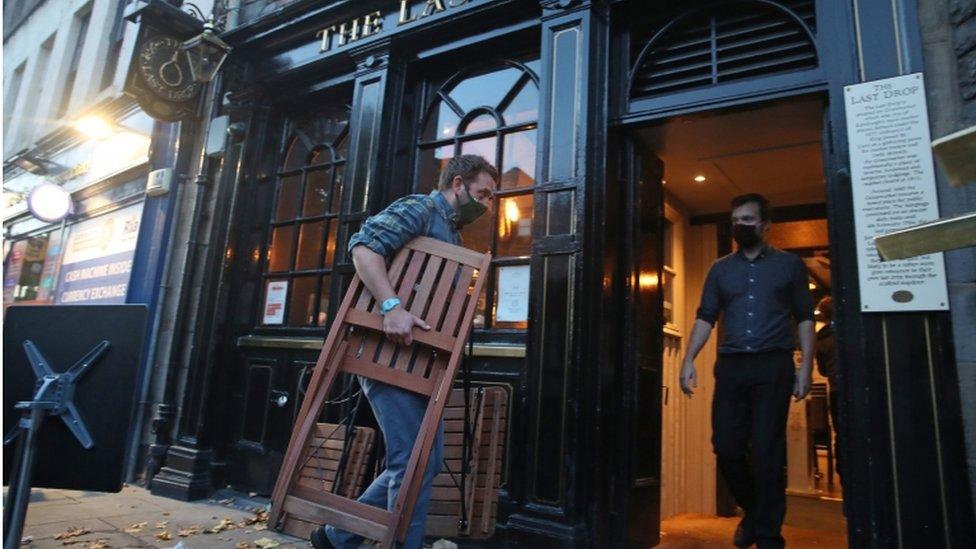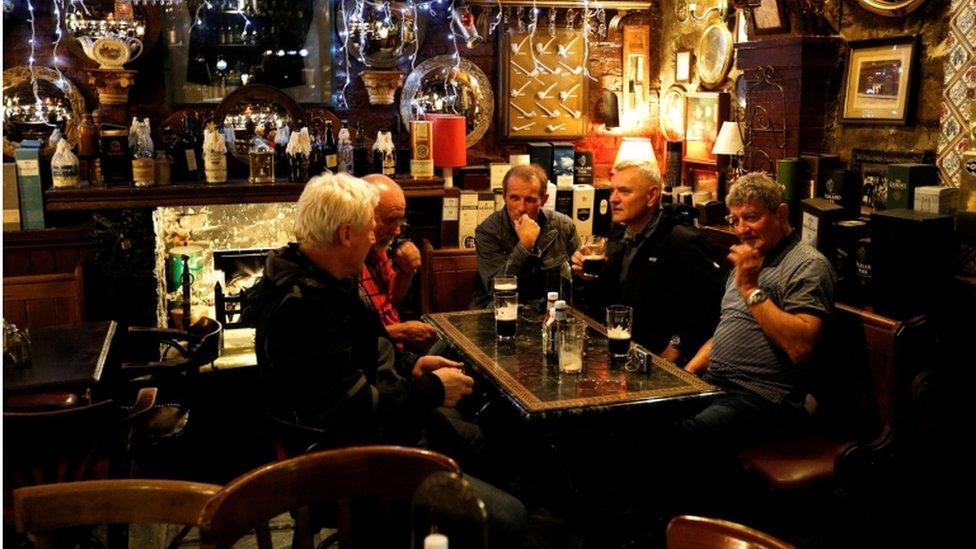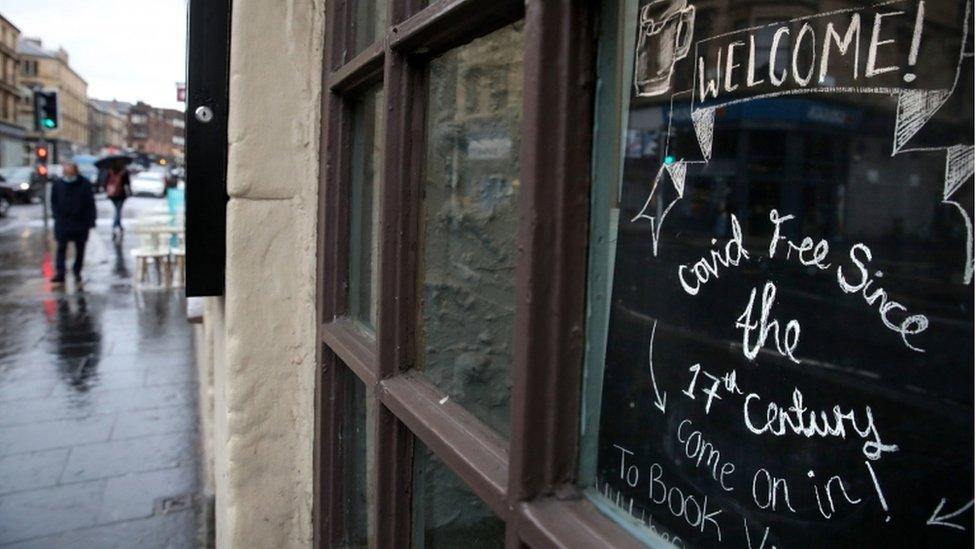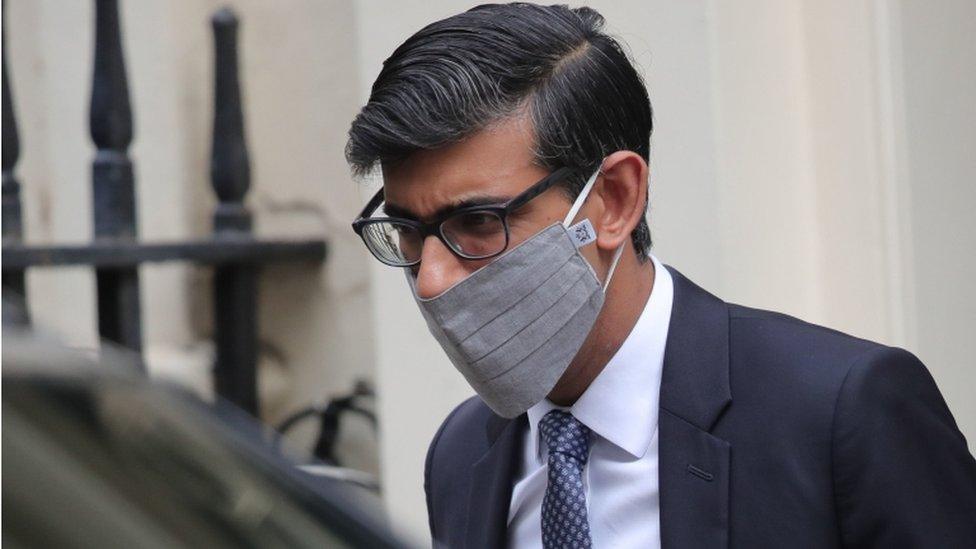Covid: Scottish government's £40m fund a 'drop in the ocean' for pubs
- Published

Pubs and restaurants across the central belt were ordered to close last Friday
The Scottish government's £40m package for licensed premises affected by coronavirus restrictions is a "drop in the ocean", industry leaders have said.
Businesses such as pubs and restaurants will be able to apply for grants of up to £3,000 if they have been closed.
They will be to claim up to £1,500 if they are still open but are seeing reduced trade.
The Scottish Hospitality Group said the money "would not touch the sides" of what was needed.
The group, which represents some of the country's best known hospitality firms, also criticised a lack of clarity about when the grants - which open for applications next Tuesday - would actually be paid out.
It said this made it difficult for business owners to plan ahead.
Scotland's finance secretary, Kate Forbes, said she wanted to make sure businesses received the money "as quickly as possible".
However, she acknowledged that it would not be enough to fully cover the income that licensed premises had lost either through closure or by having their opening hours restricted.
Pubs and restaurants in five health board areas across the central belt of Scotland have been closed for the past week, with tough restrictions placed on licensed premises elsewhere in the country.
First Minister Nicola Sturgeon has already warned that things will not return to normal when the current restrictions expire on 26 October, with the Scottish government planning to bring in a tiered system of restrictions at that point - similar to the one already in place in England.

The first minister has warned that things will not return to normal when the current restrictions on licensed premises expire later this month
Scottish Hospitality Group spokesman Stephen Montgomery said funding support offered to the sector, which employs nearly 300,000 people in Scotland, was "absolutely no good at all".
He added: "It's not going to touch the sides and we're looking at bringing redundancies forward.
"£40m may sound like a lot of money, but Liverpool City Council brought £40m over a weekend to support 3,000 businesses.
"In Scotland we've got £40m to support 20,000 businesses who are subject to restrictions of some kind."
Mr Montgomery also told the BBC's Good Morning Scotland programme that the industry had been "absolutely crippled through no fault of our own" by the restrictions.
And he said businesses still do not know when they would receive the money, which is intended to see them through until+ 26 October, or what would happen after that date.
He added: "It opens on 20 October but we don't know when we are going to get paid it.
"The people that are indirectly affected by it — how much they are going to get? When they are going to get it?
"This should have all been planned long before the announcement last week."
His concerns were echoed by James Brown, the managing director of Brewdog Bars, who said the £40m fund was a "drop in the ocean" for the industry.

Many pubs and restaurants believe they have been unfairly treated by the current restrictions
Mr Brown added: "The ones that are really going to struggle are the independent pubs - who are the lifeblood of our community - and the late night industry, which is on its knees.
"Nightclubs haven't been able to open since lockdown and there is no end in sight.
"We want to show our support and call for the government to provide more assistance. That £40m is a drop in the ocean for what is actually needed to help these businesses and keep jobs".
'Battling for survival'
Ms Forbes told BBC Scotland that she fully understood the concerns.
She added: "The grant support will never replace all lost income and it can never be distributed fast enough because businesses are battling for survival and have been for many months.
"We want to get that money out the door as quickly as possible."
Ms Forbes said the size of the grants reflected that the current restrictions were intended to be a "short, sharp intervention".
But she said they would never be a replacement for the UK government's furlough scheme, which she said had been a "lifeline" for businesses.
And she repeated her call for furlough to be fully extended by the UK government at the end of the month.

The Chancellor has already unveiled a replacement for the furlough scheme, which will end on 31 October
UK Chancellor Rishi Sunak has unveiled plans for a new Job Support Scheme, which will replace the current furlough scheme from 1 November.
Under the scheme, the government will subsidise the pay of employees who are working fewer than normal hours due to lower demand.
Workers who do at least a third of their normal hours will be paid by their employer for those hours.
The government and the employer will also pay a third each for the hours they cannot work.
It means someone working a third of their hours would receive 77% of their pay, with the government grant capped at £697.92 per month.
All small and medium sized businesses will be eligible for the UK-wide scheme, which aims to stop mass job cuts when furlough ends.

